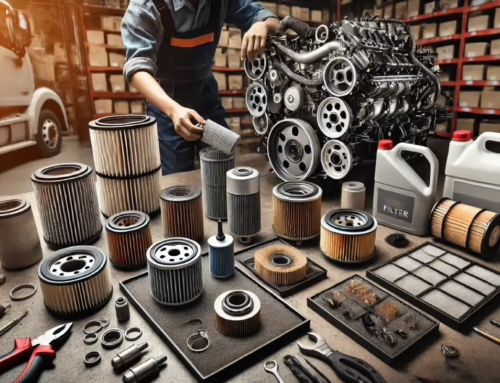Fluids and Filtration: A Deep Dive into Keeping Heavy-Duty Lubricants Clean
People like to make the comparison that the engine is the heart of a truck and the fluids are like blood. If that’s the case, you don’t want dirty blood being pumped around your body, do you? That can lead to a whole host of problems, so why is it any different for your heavy-duty vehicles?
Keeping your vehicle’s lubricants and filtration systems clean impacts all aspects of its health. It enhances performance and longevity while reducing maintenance costs and downtime. Don’t know where to start, though? Don’t sweat it; by the end of this page, you’ll understand everything you need to know about truck lubricants and filters and how to keep them clean.
The Role of Lubricants in Heavy-Duty Vehicles
Lubricants play several key roles in the health and efficiency of heavy-duty vehicles. By reducing friction, engine parts remain cool, move freely, and operate at optimal levels. They also provide a layer of protection between components, lessening the effects of wear and corrosion, and seal engine components from contaminants and the harsh outside environment.
The types of lubricants—ranging from engine oil to transmission fluid and hydraulic fluid—each serve a specific purpose tailored to the unique needs of heavy-duty vehicle components.
Understanding Contaminants and Their Impact
Contaminants such as dirt, dust, metal particles, water, and various chemicals can significantly weaken the effectiveness of lubricants. These pollutants can enter the lubrication system through various means, including the air intake system, poor-quality fuel, or even during maintenance.
The severity of damage from contamination ranges from reduced lubrication efficiency to catastrophic engine damage. This is why having a clean and functioning filtration system is so important.
The Basics of Filtration Systems
Heavy-duty vehicles rely on several types of filtration systems to maintain clean lubricants. These include oil filters, fuel filters, and air filters, each designed to target specific contaminants.
The technology behind these systems can be categorized into mechanical filtration, absorption, and centrifugal separation, each method offering its own advantages in keeping lubricants clean and free from harmful debris.
Best Practices for Fluid Maintenance
Monitoring and Analyzing Fluids
Regular monitoring is key to ensuring the longevity and reliability of lubricants. This involves visual inspections, oil analysis, and being alert to the signs of contamination. By identifying issues early, such as coolant leaks or excessive wear on components, you can prevent minor problems from escalating into major failures that require expensive repairs and downtime.
Regular Maintenance
Adhering to a routine maintenance schedule for changing fluids and filters is essential, and you should always follow manufacturer guidelines and industry standards for the best results.
Tailoring your maintenance program based on the specific needs of your vehicles, considering factors like operating environments and load demands, ensures that every aspect of your fleet receives the attention it requires. This personalized approach not only improves the efficiency of your maintenance efforts but also contributes to the overall longevity and reliability of your fleet.
If you’re a fleet manager, investing in fleet maintenance software is essential. This helps automate maintenance tasks, including scheduling.
Choosing the Right Lubricants and Filters
Selecting the correct lubricants and filters is not a one-size-fits-all solution. You need to consider:
- Vehicle/engine type
- Manufacturer
- Operating conditions
- Specific tasks the engine carries out (i.e. towing)
Opting for high-quality products that meet or exceed OEM specifications is essential for optimal protection and performance.
Practical Tips for Keeping Lubricants Clean
Minimizing the introduction of contaminants into the lubrication system starts with proper storage and handling of lubricants. Cleanliness during oil changes and preventive maintenance, such as regular inspections and timely repairs of leaks, play a significant role in maintaining the integrity of the lubrication system.
Leveraging Technology for Enhanced Filtration
Advancements in Filtration Technology
The evolution of filtration technology has introduced more sophisticated methods for keeping lubricants clean. Microglass filters, for instance, offer superior filtration efficiency compared to traditional paper-based elements, capturing finer particles without compromising flow.
Smart filtration systems equipped with sensors can now monitor filter conditions and fluid quality in real-time, providing actionable data that can preemptively address potential issues.
The Role of Synthetic Lubricants
Switching to synthetic lubricants can offer numerous benefits for your heavy-duty vehicles, including enhanced protection against wear, better performance in extreme temperatures, and extended oil change intervals. Synthetics are engineered to provide a higher degree of lubricity and stability, reducing the strain on both the engine and filtration systems.
While it may be easy to balk at the price (they’re far more expensive than regular lubricants), the long-term savings in maintenance and improved performance will benefit your bottom line.
The Future of Heavy-Duty Vehicle Maintenance
Emerging technologies such as predictive maintenance and the use of big data are set to revolutionize how fleet maintenance is approached. By analyzing vast amounts of operational data, predictive models can forecast when maintenance is required, further reducing downtime and extending vehicle life.
Environmental Considerations and Sustainability Practices
Adopting green maintenance practices not only contributes to the sustainability of your operations but can also lead to regulatory benefits and cost savings. Utilizing biodegradable lubricants, recycling used oil and filters, and optimizing maintenance schedules to reduce waste are ways to lessen your environmental footprint while maintaining high-performance standards.
Final Words
Maintaining clean lubricants and effective filtration systems is paramount to the upkeep of heavy-duty vehicles. By adopting the best practices outlined in this guide, fleet managers and truck owner-operators can significantly enhance the longevity and reliability of their vehicles.
For more information, professional advice, or to schedule oil and fluid maintenance services, don’t hesitate to contact our team. Let us help you keep your fleet running smoothly, efficiently, and, most importantly, reliably.




